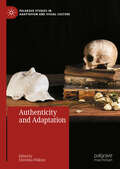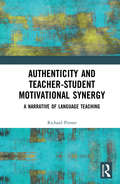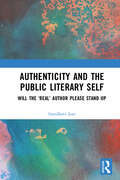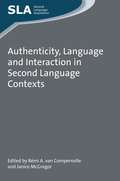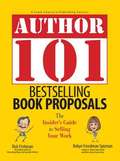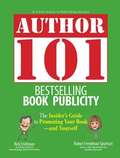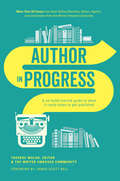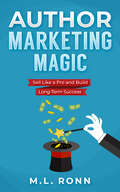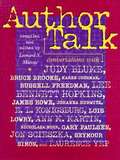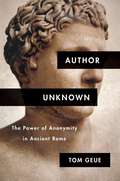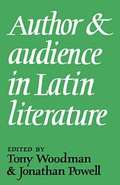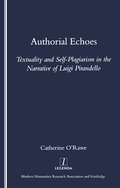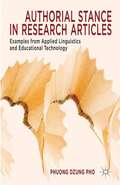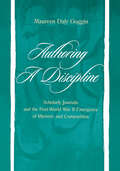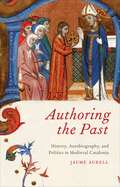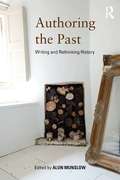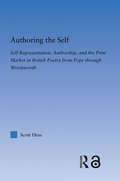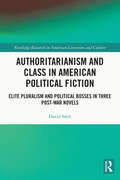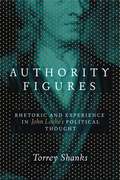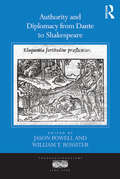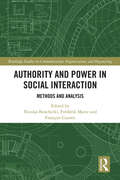- Table View
- List View
Authenticity and Adaptation (Palgrave Studies in Adaptation and Visual Culture)
by Christina WilkinsThis collection seeks to explore what authenticity means in the context of adaptation, whether there is such a thing as an authentic adaptation, and what authenticity can offer for adaptation. It does so through four specific sections, each thinking through related questions raised by the theme. By outlining theoretical approaches to authenticity, querying authorship’s relationship to adaptation, the role of medium, and the place or value of the audience, this collection brings together a holistic perspective of authenticity that will intervene in the contemporary debates within adaptation. Authenticity’s increasing importance in the zeitgeist filters through to adaptation, yet it is something that has not been explicitly debated or discussed within the field. As such, this collection both highlights and attempts to fill a gap in scholarship.
Authenticity and Teacher-Student Motivational Synergy: A Narrative of Language Teaching
by Richard PinnerDespite the common association between authenticity and motivation in language learning, there does not currently exist a single volume exploring these connections. This book looks at the relationship between authenticity and motivation by specifically viewing the process of mutually validating the act of learning as social authentication, which in turn can often lead to positive motivational synergy between students and teacher(s). The study at the centre of this book uses autoethnography and practitioner research to examine the complex relationship between authenticity and motivation in the foreign language learning classroom. In particular, it traces the links between student and teacher motivation, and proposes that authenticity can act as a bridge to connect learners to the classroom environment and engage with the activity of learning.
Authenticity and the Public Literary Self: Will The ‘Real’ Author Please Stand Up
by Sreedhevi IyerThis is the first book-length study on how authors of color present themselves in public literary discourse. The study utilizes data obtained from and around exemplary empirical case study participants – Junot Diaz, Madeleine Thien, and Mohsin Hamid. Relevant data includes the case study authors’ Twitter usage and the impact of the digital sphere in author self-presentation. Dr Iyer employs a combined theoretical framework of discourse analysis and interactional sociolinguistics, with an awareness of literary and creative writing studies. The theoretical approach uses four metapragmatic stereotypes regarding what constitutes an ‘authentic’ author. The theoretical approach and metapragmatic stereotype form an evaluative framework that can be applied on diverse data to replicate findings.The study originated from the author’s own exposure to prevailing literary discourse through public engagements as a writer. She became aware of the problematic nature of an author’s public self-presentation, with a requirement to ‘be yourself’. Each celebrity author of color faces a paradoxical positioning within literary discourse as a result of that requirement. Through her study, Dr Iyer sought to discover how authors of color negotiate themselves in public spheres, including digital social media platforms, in order to accomplish ‘authenticity’ discursively.This book is ideal for learners and practitioners in creative writing who are seeking strategies for self-presentation as published authors. It is also valuable for researchers in discourse analysis, including literary discourse and social media discourse, providing an empirical means of evaluating ‘authenticity’ as understood in contemporary times.
Authenticity, Language and Interaction in Second Language Contexts
by Rémi A. van Compernolle Janice McgregorThis collection addresses issues of authenticity in second language contexts from a variety of theoretical and methodological approaches along three principal themes: What is authentic language? Who is an authentic speaker? How is authenticity achieved? The volume responds to these questions by bringing together scholars working in a range of contexts, including with language learners in the classroom and in residence or study abroad, with a variety of second or additional languages: Chinese, English, French, German, Japanese and Spanish. Contributions focus on authenticity as it relates to patterns of language and meaning, and to agency, identity and culture, and serve as an opening to an extended conversation about the nature of authenticity and its development in L2 contexts. This volume is relevant for students and scholars interested in learning about or investigating questions of authenticity and interaction in a wide range of language learning contexts.
Author 101-Bestselling Book Proposals: The Insider's Guide to Selling Your Work
by Robyn Freedman Spizman Rick Frishman Mark SteiselA step-by-step guide to researching and writing an attention-getting book proposal.
Author 101: Bestselling Book Publicity
by Robyn Freedman Spizman Rick FrishmanPublicizing your book is critical to its success-and with Rick Frishman and Robyn Freedman Spizman as your guides, you'll be a PR whiz in no time. In this groundbreaking third volume of the Author 101 series, they'll share their hard-won secrets, as well as testimonials from publishing insiders and information from media contacts. Whether you're going with an established house or self-publishing, you'll learn how to craft the right promotional campaign for your book-the campaign that will make your book as well-read as it is well-written! Book jacket.
Author In Progress: A No-Holds-Barred Guide to What It Really Takes to Get Published
by Therese Walsh Writer Unboxed Writer UnboxedEmpower your writing through craft and community! Writing can be a lonely profession plagued by blind stumbles, writer's block, and despair--but it doesn't have to be. Written by members of the popular Writer Unboxed website, Author in Progress is filled with practical, candid essays to help you reach the next rung on the publishing ladder. By tracking your creative journey from first draft to completion and beyond, you can improve your craft, find your community, and overcome the mental barriers that stand in the way of success.Author in Progress is the perfect no-nonsense guide for excelling at every step of the novel-writing process, from setting goals, researching, and drafting to giving and receiving critiques, polishing prose, and seeking publication.Featuring essays by best-selling authors, editors, and industry leaders: Porter Anderson Julianna Baggott Brunonia Barry James Scott Bell Tom Bentley Sharon Bially Dan Blank Anne Greenwood Brown Kim Bullock Sarah Callender David Corbett Kathryn Craft Lisa Cron Keith Cronin Margaret Dilloway Jo Eberhardt Anna Elliott Bill Ferris Jane Friedman Tracy Hahn-Burkett Gwen Hernandez Kristan Hoffman Steven James Dave King Jeanne Kisacky Robin LaFevers Allie Larkin Erika Liodice Donald Maass Sophie Masson Greer Macallister Juliet Marillier Julia Munroe Martin Sarah McCoy Kathleen McCleary Jael McHenry Catherine McKenzie Liz Michalski Annie Neugebauer Jan O'Hara Barbara O'Neal Ray Rhamey Erika Robuck M.J. Rose Vaughn Roycroft Lancelot Schaubert Susan Spann Victoria Strauss John Vorhaus Therese Walsh Heather Webb Cathy Yardley "Nourishment for the writer's soul and motivation for the writer's heart." --James Scott Bell, best-selling author and writing instructor
Author Marketing Magic: Sell Like a Pro and Build Long-Term Success (Author Level Up #21)
by M.L. RonnYour roadmap to selling books without selling your soul. Do you find marketing exhausting? Do you feel like you have to do a bunch of things that don't suit your personality to sell books? Frustrating, isn't it? You're not alone. Author Marketing Magic paves a path that turns marketing from a daunting hurdle into an enjoyable process. Learn many marketing tactics and find the best ones that suit your personality. Unleash the power of: Strategic Writing: Learn to embed marketing into your book from the very first word. Copywriting Mastery: Gain insights into crafting compelling copy that resonates with your target readers. Book Description Artistry: Understand the nuances of creating tantalizing book descriptions that leave readers eager for more. Innovative Tactics: Dive into unique strategies like leveraging Kickstarter for maximum impact. Learn from M.L. Ronn (Michael La Ronn), a prolific author of over 100 books of fiction & nonfiction. He shares his failures, his successes, and best practices for building a solid marketing foundation. This book will lead you to effortless self-promotion, greater reader engagement, heightened visibility, and ultimately--more sales. You'll uncover a newfound confidence in marketing, and feel like a genius doing it. It's time to step into your marketing magic. Begin your journey to literary success with Author Marketing Magic today. V1.0
Author Talk: Conversations with 15 Children's Writers
by Leonard S. MarcusHave you ever wanted to ask your favorite author: What kind of child were you? Did you like to read? When did you become a writer? What is the best thing about being a writer? In fifteen short conversations with some of the best-known children's book authors, acclaimed author and editor Leonard S. Marcus asks these questions and more, discovering engaging details about their lives and their work. Throughout, you'll find bibliographies, manuscript pages, and other fascinating memorabilia. Author Talk is a great introduction to the people behind some of your favorite books.
Author Unknown: The Power of Anonymity in Ancient Rome
by Tom GeueClassical scholarship tends to treat anonymous authorship as a problem or game—a defect to be repaired or mystery to be solved. But anonymity can be a source of meaning unto itself, rather than a gap that needs filling. Tom Geue’s close readings of Latin texts show what the suppression or loss of a name can do for literature.
Author and Audience in Latin Literature
by Tony Woodman Jonathan PowellThe relationship between the author and his audience has received much critical attention from scholars in non-classical disciplines yet the nature of much ancient literature and of its 'publication' meant that audiences in ancient times were more immediate to their authors than in the modern world. This book contains essays by distinguished scholars on the various means by which Latin authors communicated effectively with their audiences. The authors and works covered are Cicero, Catullus, Lucretius, Propertius, Horace's Odes, Virgil's Aeneid, Ovid's Metamorphoses, Senecan tragedy, Persius, Pliny's letters, Tacitus' Annals and medieval love lyric. Contributors have provided detailed analyses of particular passages in order to throw light on the many different ways in which authors catered for their audiences by fulfilling, manipulating and thwarting their expectations; and in an epilogue the editors have drawn together the issues raised by these contributions and have attempted to place them in an appropriate critical context.
Author's Purpose Reading Comprehension Book Reading Level 3.5-5.0
by EdupressReinforces critical reading skills with a diverse range of classroom activities! Detailed teacher instruction pages. Leveled reading passages and reproducible activities. Individual, small-group and whole-class activities.
Author, Reader, Book
by Stephen Partridge Erik KwakkelThe current focus on the theme of authorship in Medieval and Early Modern studies reopens questions of poetic agency and intent. Bringing into conversation several kinds of scholarship on medieval authorship, the essays in Author, Reader, Book examine interrelated questions raised by the relationship between an author and a reader, the relationships between authors and their antecedents, and the ways in which authorship interacts with the physical presentation of texts in books.The broad chronological range within this volume reveals the persistence of literary concerns that remain consistent through different periods, languages, and cultural contexts. Theoretical reflections, case studies from a wide variety of languages, examinations of devotional literature from figures such as Bishop Reginald Pecock, and analyses of works that are more secular in focus, including some by Chaucer and Christine de Pizan, come together in this volume to transcend linguistic and disciplinary boundaries.
Authorial Echoes: Textuality and Self-plagiarism in the Narrative of Luigi Pirandello
by Catherine O'Rawe"Luigi Pirandello is best known for his experimental plays, but his narrative production has not enjoyed the same degree of critical attention. O'Rawe's study represents the first major reassessment of this output, including the 'realist' novels, the historical novel I vecchi e i giovani (1909) and the autobiographical Suo marito (1911). The book identifies in Pirandello a practice of 'self-plagiarism' - constant rewriting and revision and obsessive re-use of material - and explores the relation of these overlooked modes of composition to the author's own theories of authorship and textuality. Drawing on a wide range of critical theory, O'Rawe repositions Pirandello as a major figure in the development of European narrative modernism."
Authorial Stance in Research Articles
by Phuong Dzung PhoHow do I structure a journal article?; "Can I use 'I' in a research article?"; "Should I use an active or passive voice?" - Many such questions will be answered in this book, which documents the linguistic devices that authors use to show how they align or distance themselves from arguments and ideas, while maintaining conventions of objectivity.
Authoring A Discipline: Scholarly Journals and the Post-world War Ii Emergence of Rhetoric and Composition
by Maureen Daly GogginAuthoring a Discipline traces the post-World War II emergence of rhetoric and composition as a discipline within departments of English in institutions of higher education in the United States. Goggin brings to light both the evolution of this discipline and many of the key individuals involved in its development. Drawing on archival and oral evidence, this history offers a comprehensive and systematic investigation of scholarly journals, the editors who directed them, and the authors who contributed to them, demonstrating the influence that publications and participants have had in the emergence of rhetoric and composition as an independent field of study. Goggin considers the complex struggles in which scholars and teachers engaged to stake ground and to construct a professional and disciplinary identity. She identifies major debates and controversies that ignited as the discipline emerged and analyzes how the editors and contributors to the major scholarly journals helped to shape, and in turn were shaped by, the field of rhetoric and composition. She also coins a new term--discipliniographer--to describe those who write the field through authoring and authorizing work, thus creating the social and political contexts in which the discipline emerged. The research presented here demonstrates clearly how disciplines are social products, born of political struggles for both intellectual and material spaces.
Authoring the Past: History, Autobiography, and Politics in Medieval Catalonia
by Jaume AurellAuthoring the Past surveys medieval Catalan historiography, shedding light on the emergence and evolution of historical writing and autobiography in the Middle Ages, on questions of authority and authorship, and on the links between history and politics during the period. Jaume Aurell examines texts from the late twelfth to the late fourteenth century--including the Latin Gesta comitum Barcinonensium and four texts in medieval Catalan: James I's Llibre dels fets, the Crònica of Bernat Desclot, the Crònica of Ramon Muntaner, and the Crònica of Peter the Ceremonious--and outlines the different motivations for the writing of each. For Aurell, these chronicles are not mere archaeological artifacts but rather documents that speak to their writers' specific contemporary social and political purposes. He argues that these Catalonian counts and Aragonese kings were attempting to use their role as authors to legitimize their monarchical status, their growing political and economic power, and their aggressive expansionist policies in the Mediterranean. By analyzing these texts alongside one another, Aurell demonstrates the shifting contexts in which chronicles were conceived, written, and read throughout the Middle Ages. The first study of its kind to make medieval Catalonian writings available to English-speaking audiences, Authoring the Past will be of interest to scholars of history and comparative literature, students of Hispanic and Romance medieval studies, and medievalists who study the chronicle tradition in other languages.
Authoring the Past: History, Autobiography, and Politics in Medieval Catalonia
by Jaume AurellAuthoring the Past surveys medieval Catalan historiography, shedding light on the emergence and evolution of historical writing and autobiography in the Middle Ages, on questions of authority and authorship, and on the links between history and politics during the period. Jaume Aurell examines texts from the late twelfth to the late fourteenth century—including the Latin Gesta comitum Barcinonensium and four texts in medieval Catalan: James I’s Llibre dels fets, the Crònica of Bernat Desclot, the Crònica of Ramon Muntaner, and the Crònica of Peter the Ceremonious—and outlines the different motivations for the writing of each. For Aurell, these chronicles are not mere archaeological artifacts but rather documents that speak to their writers’ specific contemporary social and political purposes. He argues that these Catalonian counts and Aragonese kings were attempting to use their role as authors to legitimize their monarchical status, their growing political and economic power, and their aggressive expansionist policies in the Mediterranean. By analyzing these texts alongside one another, Aurell demonstrates the shifting contexts in which chronicles were conceived, written, and read throughout the Middle Ages.The first study of its kind to make medieval Catalonian writings available to English-speaking audiences, Authoring the Past will be of interest to scholars of history and comparative literature, students of Hispanic and Romance medieval studies, and medievalists who study the chronicle tradition in other languages.
Authoring the Past: Writing and Rethinking History
by Alun MunslowPlease explain why you think about and write history as you do? Collecting together the responses to this question from 15 of the world’s foremost historians and theorists, Authoring the Past represents a powerful reflection on and intervention in the historiographical field. Edited by Alun Munslow and presented in concise digestible essays, the collection covers a broad range of contemporary interests and ideas and offers a rich set of reasoned alternative thoughts on our cultural engagement with times gone by. Emerging from an intensely fertile period of historical thought and practice, Authoring the Past examines the variety of approaches to the discipline that have taken shape during this time and suggests possible future ways of thinking about and interacting with the past. It provides a unique insight into recent debates on the nature and purpose of history and demonstrates that when diverse metaphysical and aesthetic choices are made, the nature of the representation of the past becomes a matter of legitimate dispute. Students, scholars and practitioners of history will find it a stimulating and invaluable resource.
Authoring the Self: Self-Representation, Authorship, and the Print Market in British Poetry from Pope through Wordsworth (Literary Criticism and Cultural Theory)
by Scott HessDrawing upon historicist and cultural studies approaches to literature, this book argues that the Romantic construction of the self emerged out of the growth of commercial print culture and the expansion and fragmentation of the reading public beginning in eighteenth-century Britain. Arguing for continuity between eighteenth-century literature and the rise of Romanticism, this groundbreaking book traces the influence of new print market conditions on the development of the Romantic poetic self.
Authoritarianism and Class in American Political Fiction: Elite Pluralism and Political Bosses in Three Post-War Novels (Routledge Research in American Literature and Culture)
by David SmitThis book analyzes what many critics consider to be the three best examples of modern American political fiction—Robert Penn Warren’s All the King’s Men, Edwin O’Connor’s The Last Hurrah, and Billy Lee Brammer’s The Gay Place—to address a specific problem in American governance: how the intense competition for power among elite factions often results in their ignoring major groups of their constituents, thereby providing political bosses with a rationale to seize authoritarian control of the government in the name of constituent groups who feel ignored or neglected, promising them more democratic rule, but in the process, excluding other groups, so that the bosses themselves become elitist, ruling only for the sake of some constituents and not others.
Authority Figures: Rhetoric and Experience in John Locke's Political Thought
by Torrey ShanksIn Authority Figures, Torrey Shanks uncovers the essential but largely unappreciated place of rhetoric in John Locke’s political and philosophical thought. Locke’s well-known hostility to rhetoric has obscured an important debt to figural and inventive language. Here, Shanks traces the close ties between rhetoric and experience as they form the basis for a theory and practice of judgment at the center of Locke’s work. Rhetoric and experience come together, for Locke, to reorient readers’ relation to the past in order to open up alternative political futures. Recognizing this debt sets the stage for a new understanding of the Two Treatises of Government, in which the material and creative force of language is necessary for political critique.Authority Figures draws together political theory and philosophy, the history of science and of rhetoric, and philosophy of language and literary theory to offer an interpretation of Locke’s political thought that shows the ongoing importance of rhetoric for new modes of critique in the seventeenth century. Locke’s thought offers up insights for rethinking the relationship of rhetoric and experience to political critique, as well as the intersections of language and materialism.
Authority Figures: Rhetoric and Experience in John Locke's Political Thought
by Torrey ShanksIn Authority Figures, Torrey Shanks uncovers the essential but largely unappreciated place of rhetoric in John Locke’s political and philosophical thought. Locke’s well-known hostility to rhetoric has obscured an important debt to figural and inventive language. Here, Shanks traces the close ties between rhetoric and experience as they form the basis for a theory and practice of judgment at the center of Locke’s work. Rhetoric and experience come together, for Locke, to reorient readers’ relation to the past in order to open up alternative political futures. Recognizing this debt sets the stage for a new understanding of the Two Treatises of Government, in which the material and creative force of language is necessary for political critique.Authority Figures draws together political theory and philosophy, the history of science and of rhetoric, and philosophy of language and literary theory to offer an interpretation of Locke’s political thought that shows the ongoing importance of rhetoric for new modes of critique in the seventeenth century. Locke’s thought offers up insights for rethinking the relationship of rhetoric and experience to political critique, as well as the intersections of language and materialism.
Authority and Diplomacy from Dante to Shakespeare (Transculturalisms, 1400-1700)
by Jason Powell William T. RossiterA detailed examination of the relationship between the discourses and practices of authority and diplomacy in the late medieval and early modern periods, Authority and Diplomacy from Dante to Shakespeare interrogates the persistent duality of the roles of author and ambassador. The volume approaches its subject from a literary-historical perspective, drawing upon late medieval and early modern ideas and discourses of diplomacy and authority, and examining how they are manifested within different forms of writing: drama, poetry, diplomatic correspondence, peace treaties, and household accounts. Contributors focus on major literary figures from different cultures, including Dante, Petrarch, and Tasso from Italy; and from England, Chaucer, Wyatt, Sidney, Spenser, and Shakespeare. In addition, the book moves between and across literary-historical periods, tracing the development of concepts and discourses of authority and diplomacy from the late medieval to the early modern period. Taken together, these essays forge a broader argument for the centrality of diplomacy and diplomatic concepts in the literature and culture of late medieval and early modern England, and for the importance of diplomacy in current studies of English literature before 1603.
Authority and Power in Social Interaction: Methods and Analysis (Routledge Studies in Communication, Organization, and Organizing)
by François Cooren Nicolas Bencherki Frédérik MatteAuthority and Power in Social Interaction explores methods of analyzing authority and power in the minutiae of interaction. Drawing on the expertise of a diverse international team of organizational communication and language and social interaction scholars, this book suggests reverting the perspective that notions of authority and power constrain human activity, to determine how people (re)create them through conversation and other joint action. Confronting several perspectives within each chapter, the book offers a broad range of approaches to each theme: how and when to bring "context" into the analysis, formal authority, institutions, bodies and materiality, immateriality, and third parties. A core belief of this volume is that authority and power are not looming over human activity; rather, we weave together the constraints that we mutually impose on each other. Observing the details of how this joint process takes place may at once better account for how authority and power emerge and impact our actions, and provide guidelines on how to resist them. This book will be an important reference for students and scholars in language and social interaction, organizational communication, as well as those interested in an alternative take on issues of authority and power. It will also find resonance among those interested in managements studies, public administration and other disciplines interested in situations where authority is a crucial issue.
